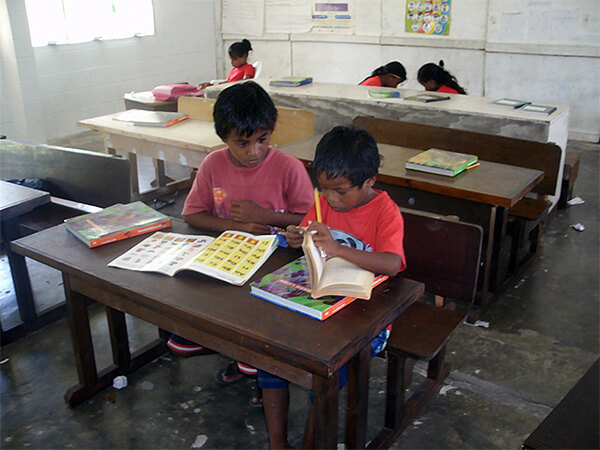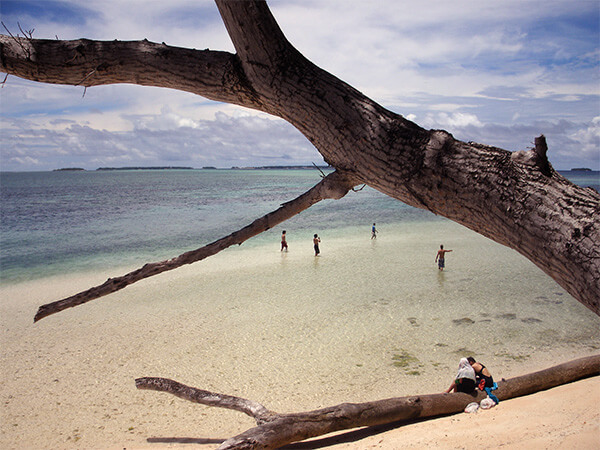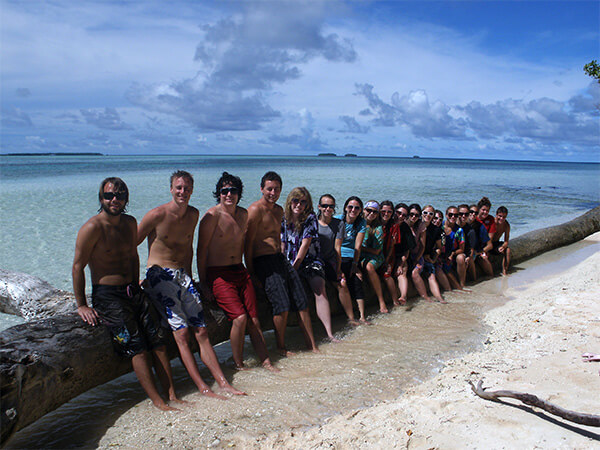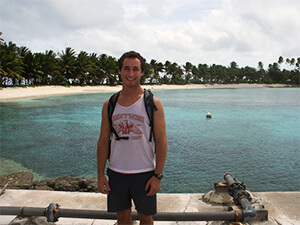Volunteer in the Marshall Islands
Be Careful What You Wish For
Thinking About Teaching Abroad in a Developing Nation?
Article and photo by Sam Cortina

|
|
A classroom where the author taught these and other young children in the Marshall Islands.
|
The year 2000:
Friend: “So, what are your plans for next year?”
Me: “Oh, I am going to Mira Costa High School.”
The year 2005:
Friend: “So, what are your plans for next year?”
Me: “Oh, I am going to UCLA and majoring in Communication Studies.”
The year 2009:
Friend: “So, what are your plans for next year?”
Me: “Oh…”
The common problem facing almost every 4-year undergraduate student could be exemplified by a simple question — “What are you doing next year?” It used to be a question answered without exerting effort. When you are in high school, you know that you need to go to college. When you attend your university, you know you must choose a major. After you select your major, you look in the school catalog and choose the classes that will fulfill your requirements. But when you finish your requirements for your major, you know that you need to… choose a future? Everything before your last year of college seems planned and set. You go out with your friends, you pry yourself out of bed to get to your class at a semi-reasonable hour, you finish your papers and assignments and turn them in as close to the deadline as physically possible, you check your Facebook account, and then you go back out with your friends; but then all of a sudden you are in your last year, the schedule stops, and you have to think for yourself. Your anxiety peaks at the thought of family gatherings and the stress-inducing inquisitions you are sure to encounter with the small chat regarding your “plans.” Life is not so easy anymore.
Why Teach Abroad After Graduation?
So, the appeal of teaching abroad becomes abundantly clear. Most people view teaching abroad as an escape from the real world's responsibilities, a 1-year moratorium on doubts concerning your future. It seems so simple and covers all of the bases: I can go almost anywhere in the world; I don’t have to pay for my travels (in some cases); and I have the opportunity to escape to a stress-free environment while avoiding the inevitable onslaught of career-oriented decisions or pressures that come with being at home.
If the list above mirrors your thought process, I would not teach abroad. At all costs, avoid going to a foreign corner of the world where you will be immersed in an alien culture. Your concerns are trivial, and there will be no people there to hold your hand and spoon-feed you any answers to your questions or doubts. Your uncertainty will only become larger, your insecurities will only swell, and your comfortable perspective will be shattered.
However, if your curiosity is perked by the thought of growing in a new life, broadening your views in a highly challenging environment, living outside your comfort zone, testing your physical and emotional limits, and most importantly, contributing to a developing nation and disadvantaged people to offer them help with the opportunities you have had in your own life… then please, by all means, apply because the “making a difference” industry desperately needs your help.
Pre-Departure
One of the most distressing and nerve-wracking times in teaching abroad can be, most interestingly, prior to your departure. You have to find the correct program, place, time, financial situation, and motivation to sign your name to a contract and commit to a year away from your family, friends, and the luxuries of living in a developed nation.
I started this adventure by walking three blocks to UCLA’s career center to ask about teaching abroad opportunities. After a brief conversation with an advisor specially designated to deal with teaching abroad for graduates, I was given a handout with a list of programs, their URLs, and application deadlines. Unfortunately, I was already inquiring too late for about half of the programs. Assume you desire the cream of the crop. In that case, you need to begin your application process early in the academic year before your departure.
I followed the links provided to me for general teaching abroad websites, as well as specific programs where the deadlines had yet to pass:
I also compiled a list of criteria I would look for in each program to find the correct match for my specific interests:
-
Location (developing nation, Europe, Asia, etc.)
-
Living conditions (where and who I would live with during the program)
-
Cost of the program (all-inclusive, partially subsidized)
-
Length of the program (semester, year)
-
What I would specifically be teaching (English, math, history, or science, and to what grade levels)
-
What credentials were necessary before departure (i.e., an undergraduate degree only or possibly teaching experience)
-
The support and oversight provided by the program (individual ambition leading my cause, or possibly a program with strict regulations and itinerary)
After a thorough review of my options, and upon completing the application process (three essays, two letters of recommendation, a phone interview, and a medical screening), I selected WorldTeach, a teach-abroad program then run through Harvard that has established locations in a vast array of countries throughout the world. The program would be a year-long adventure to the Republic of the Marshall Islands, a Pacific island nation battling to enter the 21st century while holding onto its historical cultural ties. I would teach English and Math to 1st-8th grade students, and my expenses would be covered by the Marshallese Ministry of Education (flight, room and board, and health insurance). I would live with a host family, on an isolated island with a total population of 150 people, without electricity (beyond a handful of solar panels) or running water, and had to pack for my trip to an unknown world.
One of the most important things you can do pre-departure to ensure the most enjoyable experience for the following year is to immediately throw out your own preferences, nuances, and sense of style or fashion and strictly adhere to the packing list provided to you by the program you enlist. In Marshallese culture, women cannot publicly show their knees or shoulders. This includes running, swimming, snorkeling, cooking, and teaching. Initially, the female volunteers complained incessantly about their stifling wardrobe; however, eight months into our journey, many have found that they prefer island-style clothing because of its simplicity. While men have a much less strict code regarding their attire, the culture is generally much more conservative than that of the United States or other Western nations. Dressing inappropriately is the easiest way to show the locals that you have no respect for their culture and to instantly alienate yourself as a foreigner. Make sure you pack with consideration to the customs of the region and the people you will be visiting. You may think that “guams” (traditional Marshallese dresses) look hideous and do not enhance your natural features; however, it is what all Marshallese women on outer islands wear, and if that is where you are going to live, you need to wear them as well… period. Other important things to note: if the program says not to bring anything you wouldn’t mind losing or having destroyed due to the country's humidity or wear and tear, then do not bring those items. Your life can be made much simpler by adhering to the advice of the program you enroll in. If you find your specific situation to differ from what is reported by the program, you can constantly adjust or have more things sent to you later.
Stepping on Marshallese Soil
-
Application? Check.
-
Accepted? Check.
-
Received Confirmation Email? Check.
-
Purchased Necessary Supplies? Check.
-
Found Passport in Parent's House? Check.
-
Packed My Bags According to the Continental Weight Limit? Check.
-
Am I Really Ready to Leave For A Year? Oh...
Arriving at the airport in Los Angeles in mid-July to depart for an island nation, knowing I would be out of contact with my family, friends, and modern amenities for a year while being engulfed in a new life with people who do not speak my language, made me take a deep breath and remind myself of why I was leaving: to give back and to grow. You cannot grow if you never step outside your comfort zone, and the Marshall Islands is a perfect place to give back.
One overlooked aspect of volunteering is the experience you share with other volunteers. In Hawaii, waiting for the next plane to depart to the Marshall Islands, I looked around the terminal to witness 38 other curious faces, adorned with bulging backpacks and water bottles, examining their surroundings and similarly taking deep breaths in their attempt to process the same feelings I found myself facing. This was the first time I realized how large of an impact these people would have on my journey, and I was still underestimating their future effects.
After six hours of anxious airtime, we descended toward the Marshall Islands, a speckle of low-lying islands in the Pacific Ocean. The majesty of our perspective is unfathomable. While daunting to a foreigner, the isolation has allowed this area of the world to blossom without repercussions from anthropogenic harm. I looked down from my window seat and gazed upon shades of blue I never knew existed, spanning towards the horizon, where my eyes lifted to be met by the purest full sun I have ever witnessed. Then we landed, and reality set in.
The Marshall Islands are hot and humid, as you may never have experienced. The average temperature throughout the year is 88 degrees Fahrenheit. The most significant deviation for every month’s average temperature does not exceed a one-degree change, and the humidity pries a permanent stream of fluid from every pore on your body at all hours of day and night. We stood in line, waiting to pass customs at the single-airstrip airport, trying not to talk and expend any energy that would reappear in dripping sweat. This was our introduction to the Marshall Islands — a beautiful scenic tour followed by a blast of heat and waiting in line (a relatively accurate forewarning of our experience to come).

|
|
A typical beach scene in the Marshall Islands.
|
Orientation
Your introduction and orientation allow you to become acquainted with the country while learning with fellow volunteers who can provide a support cushion. You set many expectations for yourself, and it will be the first time you have had the opportunity to incorporate your cultural training with your own experiences in your country. We were briefed on everything imaginable concerning the Marshall Islands. Their slightly magnificent but simultaneously depressing history (including the United States nuclear testing that went awry), their unique family structures (uncles and aunts are considered fathers and mothers, cousins are sisters and brothers, and biological ownership of a child is not the primary determinant in who raises the child), their sense of community and sharing (the concept of private property is essentially non-existent), and most importantly, their struggling education system that the Marshall Islands government has dedicated an enormous portion of its national budget to improving. We had discussions, lectures, tours, and instructional periods to become fully engaged and informed about Marshallese culture while waiting with the other volunteers to leave the capital island for our respective outer islands and teaching positions.
Pay close attention during orientation, but also take the information you receive with a grain of salt. You will have the opportunity to learn about this unique world from people who have lived through the same experiences they expect you to encounter; however, it is essential to note that generalizations are inaccurate and detrimental when they become prejudiced. For example, it was easy to say, “All Marshallese people know how to fish.” This broad statement would seem to make sense, considering the Marshallese have been surviving off their fishing prowess for over a thousand years. However, I have met several young Marshallese men who refuse to fish because they fear sharks. This is a simple example without much consequence, but one that hopefully highlights a significant issue when applying more impacting generalizations such as “These people are all really shy,” or “In this culture it is important for men to establish dominance early in life,” etc. depending upon where you are heading in the world. Life in the Marshall Islands varies significantly from island to island and family to family. Volunteers on the same atoll often have experiences on opposite ends of the spectrum.
We slept in three classrooms in an elementary school on the capital island during orientation. We slept on the floor with sleeping mats provided by WorldTeach, and we crammed 39 people into our “jikin kiki” (sleeping places). We were all faced with immediate discomfort and shock. Living in a developing nation is not a vacation or break from real life, no matter how picturesque the scenery may be. It is reality intensified by a power of ten. On the capital island, power outages are frequent, and water runs out every dry season. There can be no electricity on outer islands, and water runs out even when it is not dry season. During orientation, we were spoiled with consistent access to electrical outlets and even a kitchen with a stove and sink with running water (sometimes). Before leaving for your adventure, ask yourself if you would be comfortable going a year without checking your email, calling your parents, seeing your dogs, hearing your friends’ voices, enjoying air conditioning or running water or electricity, and eating essentially the same food every day (food prepared for sustenance before taste).

|
|
Fellow volunteers in the Marshall Islands sitting on a beach wall in front of the ocean.
|
During this 3-week crash course featuring a small taste of all that is the Marshall Islands, our group of volunteers became very close and intimate. We ate, cleaned, learned, and lived on top of each other — it was inevitable that we would become close. It has been very beneficial to me to maintain the relationships created during orientation, as other volunteers in your program are really the only people in the world who can relate to you if you ever need to talk about issues or concerns (which you will need to do at some point, guaranteed).
Now You Are Ready to Go
I will not give you a rant on what to expect for your specific experience because that would be impossible. It would be useless to detail my own experience on Ulien Island because every single volunteer’s experience is vastly different depending on their host family situation, the friends they do or do not make on their island, the school they teach at, their students, the amenities they get from time to time — and, these variations from island to island and placement to placement are impossible to predict.
This piece has been intentionally written to prepare you for teaching abroad by giving you the details you need before arriving on location. You should know that teaching abroad requires no vacation or a year off. It is an enriching experience but highly challenging. The most crucial point to remember when teaching abroad is to expect the unexpected. I cannot tell you what your experience will be like, but I can tell you to be wary of cultural norms and do your best to thrive in a new environment. Let go of your anxieties and predispositions and fulfill your original plan of learning and growing by giving back to the world. The Marshall Islands is a developing nation, and like many others in the world, this means you may go without water, electricity, or amenities for days or weeks at a time; always keep in mind why you originally signed up to teach abroad and grow. Many people romanticize living in a developing nation, especially an isolated Pacific Island, envisioning peace, quiet, comfort, and beautiful scenery. Be careful what you wish for — while the Marshall Islands is chockfull of the qualities above, you must also be prepared to work harder than you ever have in your life, live without luxuries you once took for granted, press yourself to the extremes of your capabilities, and adapt to a new way of life that will force you to grow, mature, and become more independent. Good luck and remember this is the main reason you should be going!

|
Samuel Cortina graduated from the University of California, Los Angeles, in 2009 with a bachelor’s degree in Communication Studies. He currently lives in the Republic of the Marshall Islands, teaching elementary school on Ulien Island as a volunteer. Samuel’s hometown is Redondo Beach, California.
|
|
